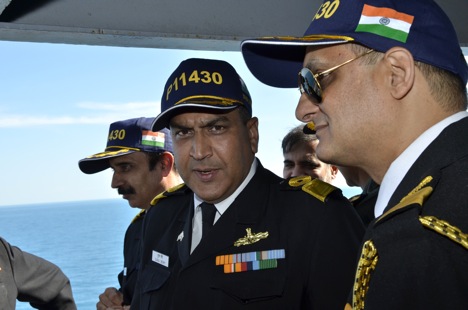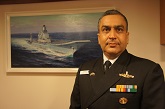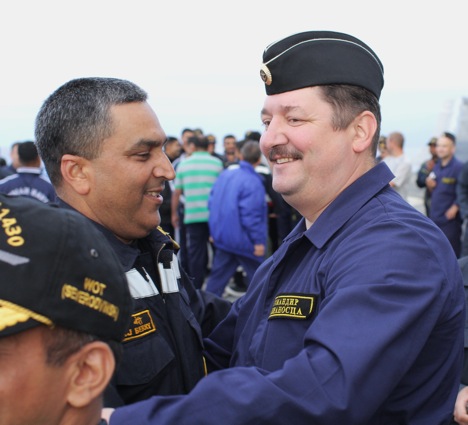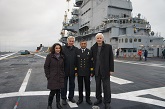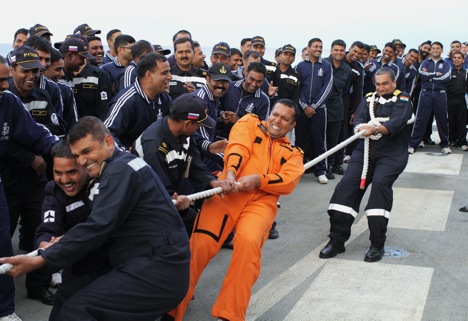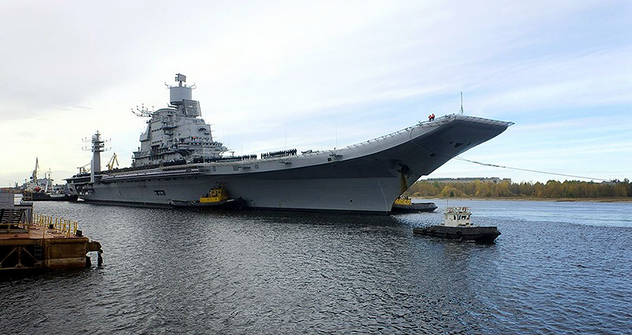Commodore Suraj Berry's finest hour
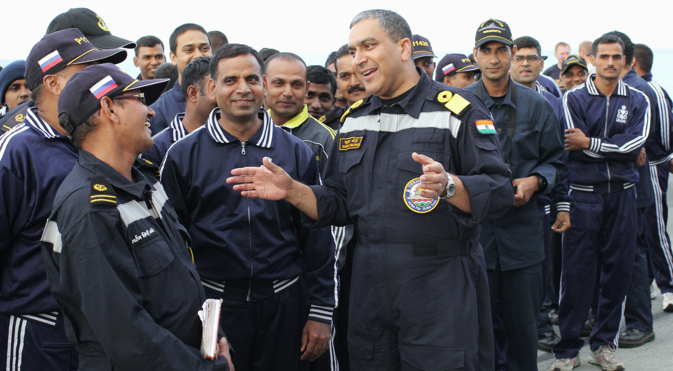
Suraj Berry: “Severodvinsk for me became a home far from home. The hospitality and respect shown to me in this marine city will live in the memory." Source: Oleg Perov
December 4, India’s Navy Day is a doubly festive occasion for the crew of the INS Vikramaditya, with the state of the art aircraft carrier now part of the Indian Navy and bound for Karwar . Few people are as delighted as the ship’s commanding officer Commodore Suraj Berry. Since taking over the vessel on November 16, 2013, Commodore Berry has shouldered a large responsibility. He is aware of his obligations, believes in his team, and is ready to tap his reserves of experience. Commodore Berry has 26 years of naval service under his belt.
He recalls how he was born into a military family, studied at a naval academy, and was joined the Indian Navy in 1987. Although he considered himself an expert in artillery and rocket launchers, he was assigned other duties. His professional biography includes service aboard the Subhadra coastal patrol vessel, the Pralaya missile boat, and the Ranjit, Ranvir, and Delhi destroyers.
Source: Maxim Vorkunkov
“I had the honour and privilege to be a member of the crew of the Delhi destroyer,” he said in an interview with Rossiyskaya Gazeta. “I commanded the Nirbhik missile boat, the Karmuk patrol ship, and the Talwar frigate. Onshore, I performed duties at the headquarters of the Western Naval Command and was as an officer — an expert in Frontier-E coastal missile battery operations; I also served as a defence adviser to Sri Lanka and the Maldives, as director of recruitment at the Indian Navy HQ, and as an assistant to the Chief of Naval Staff. Furthermore, I completed courses in naval staff recruitment at the US Naval War College in Rhode Island.”
We will add a bit of colour to Commodore Berry's rather dry assessment of himself. At Rhode Island, he graduated with honours. For operations after the tsunami in Sri Lanka and the Maldives, he was awarded the Vishisht Seva Medal for Distinguished Service, and during his specialization courses, he was conferred the title “Best Multidisciplinary Officer.”
Suraj Berry's appointment as commander of the Vikramaditya came in March 2012. Asked how his family had reacted to the news, he replied laconically in military fashion: “They are happy and proud of the trust that our fleet has placed in me.”
Members of the Russian delivery team that prepared and tested the seaworthiness of the vessel spent more than 122 days with the Indian crew on the White and Barents seas. They noted the qualities of Suraj Berry's leadership — his high work capacity, personal organization, erudition, and exacting standards of himself and his subordinates.
Suraj Berry and the Russian crew commander Captain of the first rank Igor Ryabko. Source: Oleg Perov
He expounds his life principles and attitude to service as follows: “Work honestly and responsibly in the service of your country and fleet. What's good for the ship and the fleet is good for all. Make every effort to study and work in a team — the ship and crew come first. Planning ahead and optimal use of resources are the key to success. Ultimately, what matters are the people who serve the mechanisms. The Indian Navy is full of outstanding professionals, ready for any challenge, anywhere, anytime. I am honoUred to be among them...”
During the tests, the aircraft carrier covered 1700 miles under Commodore Berry's command. Moreover, during the period 2012-2013, 875 Indian officers and sailors gained practical experience aboard the Vikramaditya. They solved many important and difficult tasks. But perhaps the most striking event was the first landing of a MiG-29 KUB on the deck of the carrier.
Commodore Berry and his subordinates remember well the day and the hour — July 28, 2012, 0930 Moscow time — when MiG test pilots Mikhail Belyaev and Hero of Russia Nikolai Diorditsa touched down into the arresting gear of the Vikramaditya with meticulous precision. The mood was one of joy and elation, followed by a debriefing and clearance for takeoff. The fighter taxied to the starting position, hit the afterburner switch, and after several seconds of acceleration tore away from the ramp. After multiple passes over the ship, the pilots performed another beautifully soft landing.
“The safe, successful landing of the MiG-29 KUB and subsequent takeoff was a dream a long time in the making,” said Commodore Berry at the time. “It was the dream and goal of Sevmash, RAC MiG, and the Russian and Indian fleets. Together, we sought to turn the ship into an aircraft carrier. There were successes and failures along the way. But we were all focused on a positive outcome, and got the job done.”
Source: Oleg Perov
The day before, says the commander, the entire Indian crew had gathered in the hangar of the Vikramaditya for a prayer meeting. They prayed that the launch at sea and first landing would go well. “And today we are happy,” Berry said.
A year later, when carrier-based fighters (not to mention helicopters) had made more than 50 takeoffs and landings on the Vikramaditya, and the carrier itself had been tested at maximum speed, Commodore Berry praised the combat qualities of the “floating airfield.”
“The high class of the vessel has been confirmed by speed tests and night flights — all executed flawlessly.”
Noting the achievements of the shipbuilders of Sevmash, the experts of Nevsky Design Bureau, and the pilots of RAC MiG, the commander of the Indian crew individually thanked his colleagues: senior officers of the Russian Navy First Rank Captains Alexander Shevchenko and Igor Ryabko, who were always close by at the most crucial moments of the tests to share their experience and help master the controls of this unfamiliar (for India) vessel.
During the two years he spent in northern Russia, Suraj Berry, in his own words, found many new friends and made the acquaintance of real professionals.
“Severodvinsk for me became a home far from home. The hospitality and respect shown to me in this marine city will live in the memory. I'm sure I'll remember Severodvinsk until the end of my days. And I look forward to returning for a glimpse of the cedar tree I planted.”
All rights reserved by Rossiyskaya Gazeta.
Subscribe
to our newsletter!
Get the week's best stories straight to your inbox
